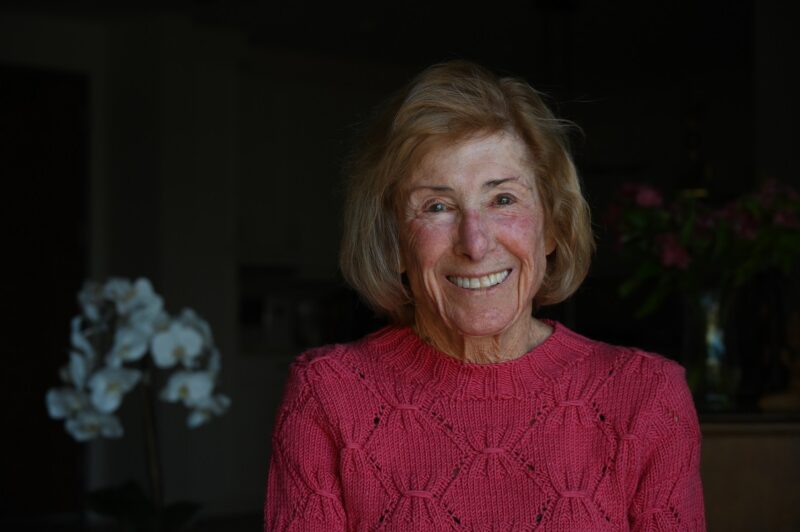
Gabriele Goldaper
Holocaust Survivor,
“My parents, Richard and Gertrude Mainzer, were born in Germany and worked as lawyers. With the rise of Hitler and the Nazi Party coming to power in 1933, the treatment of Jews began to deteriorate rapidly. The enactment of the Antisemitic Nuremberg Laws in 1935 resulted in Jews being stripped of their civil rights. My parents wisely realized that they could no longer remain in Germany, where it was becoming increasingly dangerous for its Jewish citizens.
My parents decided to leave Germany while it was still possible, and they moved to Amsterdam in the Netherlands. It was very fortunate that they chose to leave Germany, because I don’t know what would have happened to them if they had stayed. In 1937, two years after the enactment of the Nuremberg Laws, I was born in Amsterdam, Netherlands, and in 1939, my younger brother Frank joined the family. From what I remember, I had a happy childhood in Amsterdam until the winds of World War II reached there as well, and once again, my parents realized that they had to escape.
My parents tried to get all of us onto the last boat that was smuggling people out of the Netherlands, but unfortunately, it was already overcrowded. They managed to lift me onto the boat; however, when they realized they couldn’t board with my brother Frank, I was brought back to them on the dock, and the boat departed without us. It was heartbreaking that we couldn’t escape, but my mother was determined to do whatever it took to save us – even if it meant being separated from us. Shortly after this, my father was arrested and sent to jail.
My mother’s gynecologist heard of our situation and informed her that she knew of two Christian women who were willing to hide a few young Jewish children. The doctor herself offered to hide my mother while we went to live with the two women hiding us. We hid in their home for nine long months, along with six other Jewish children, never leaving the house during the day. Sometimes, when it was completely dark, we would go outside for a brief breath of fresh air. Unfortunately, the neighbors of those wonderful women betrayed us by telling the Gestapo. Subsequently, one day a truck arrived with Nazi soldiers who arrested all the children as well as the women who had sheltered us. The soldiers loaded us onto the truck, and took us to Westerbork, a prison-type detention camp, which served as a transit camp for Dutch Jews before their deportation to the various concentration/death camps in Eastern Europe.
The women who hid us took an enormous risk by sheltering us. To the best of my knowledge, one of them died shortly after her arrest, while the other managed to survive the war, and my parents did keep in touch with her. It is truly heroic that they opened their home to us and showed such incredible care and compassion. Thanks to these women, we were able to hide for nine months, which played a crucial role in our survival during the war. I will be forever grateful to these brave women who risked their lives to save my brother and myself.
When my mother heard about our arrest and deportation to Westerbork, she was determined to reunite with us. When she arrived at the gate of the detention camp she turned herself in order to be with us. When she demanded to see us, we did not answer when the guards called our names. That’s because the women who hid us had given us Christian names and my mother had used our birth names. Finally, she realized what needed to be done. She used our Christian names and my brother and I answered the call. Sadly, however, both of us did not recognize her, after being separated from her for almost a year and being so very young. We asked, ‘Who is that?’ and had no idea it was our mother. After much hugging and explaining to my brother who was just over 2 and myself, 3 1/2, we understood. To this day, I think of my mother and how devastated she must have been. We were held in Westerbork for about six months, and then we were loaded onto train cars and transported to the Bergen-Belsen concentration camp. My mother went through all of this without my father, as he was still held captive in a jail somewhere.
I remember that in the camp, my brother and I were always in close sight of our mother. She was constantly watching over us. My brother and I shared one narrow bed, each of us placing our feet in opposite directions.
To make sure no one had escaped, all of us had to stand outside in the cold and be constantly counted. My mother, to keep us warm, would hide both of us under her skirt until the guards got to our row and we were accounted for.
I remember we were always hungry. If we were lucky, we’d get a slice of dry bread and a kind of watery soup, but nothing more than that. I don’t know how, but we managed to survive the camp, but we were among the lucky ones. I think it was because of my mother’s determination to survive. This internal drive for survival and determination is still a part of myself as well. Finally, in 1945, the British forces liberated us.
One of the things I learned during the Holocaust was the importance of family. Thanks to my mother, who cared for my brother and myself, we survived. I can’t imagine what would have happened to us if my mother hadn’t come to the Westerbork detention camp and later on to Bergen-Belsen with us. She was a remarkable woman who did everything she could to protect her children.
The importance of family revealed itself to us once again after the war when my mother’s brother Hans came to rescue us. In 1935, Hans decided to leave the Netherlands and was able to immigrate to the United States, where he joined the US army. He believed that by joining the American army he might one day be able to help his family, still trapped in Europe – and that’s exactly what happened. He was sent to fight in Europe, and after the war, he learned that we had been in Bergen-Belsen and that when the camp was liberated all of us were sent to live in Red Cross camps. In the Red Cross camps we were given daily packages of assorted foods and the three of us were able to recover a little from the horrors of Bergen-Belsen. My uncle’s goal was to help us to get to the United States. After a difficult and extended journey that included returning to Germany and the Netherlands, passing through Spain, France, and Cuba, we managed finally to get to the United States.
My father, also survived the Holocaust. Apparently a prison guard enabled my father to escape the prison. My father somehow managed to obtain passage to Cuba. Through post-war publications of lists of names of survivors he discovered that we had survived. This was also how my mother eventually learned that my father not only had survived, but was living in Cuba.Now both parents did everything in their power to bring us together in Cuba. When we finally arrived in Cuba and reunited with my father, it was an incredibly emotional moment. I was 11 years old, and having been separated from him for so many years, it was overwhelming. I showed him my doll, and I remember us hugging tightly. It took us three years, but eventually, we made our way to Miami, and from there to New York, where we began our new American life.
In America, my parents, who were both trained as lawyers in Germany, returned to law school to obtain their legal licenses in the United States. They had to support their family, so they worked during the day and studied at night. Despite all the challenges, including the new language and adjusting to a different life, they succeeded in completing their studies and becoming lawyers in America.
It’s worth emphasizing that not only did my mother successfully complete her legal studies and practiced law, she also eventually became the first Jewish woman appointed as a judge in New York’s Family Court. Later, when she was forced to retire from the bench, she went on to become a Family Law professor at the Cardozo Law School where she finally retired at eighty-seven. She was truly an extraordinary woman and an inspiration to all who knew her.
For most of my life, I buried the memories of what I endured during the Holocaust. I couldn’t bring myself to talk about it. It was perhaps, my way of protecting myself, a psychological shield to keep me from falling apart.
I couldn’t bear to confront the unbearable pain, the hunger, the constant terror and nightmares. Pushing those dark memories away was the only way I could survive and try to rebuild my life after the Holocaust, keeping the ugliness locked away.
About a year ago, I was invited to speak about what happened to me during the Holocaust at an event that raised funds for Holocaust survivors. My initial instinct was to refuse, but the event organizer explained that it was for an important cause and asked me to reconsider. In the end, I decided to attend the event and share with the audience what I went through during the Holocaust. It was the very first time I ever spoke about my Holocaust experience to anyone including my own children. It was very emotional and difficult but at the same time perhaps even somewhat helpful to me.
Today, I am telling my story for only the second time, not to raise money for Holocaust survivors, but to let people understand the consequences and the horrors that antisemitism can lead to. I feel it is critical to remind people, especially young people, that it is important to fight for our freedom and never give up.”
